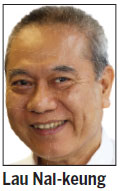Chris Patten promised a lunatic democracy
Updated: 2014-09-16 06:20
By Lau Nai-keung(HK Edition)
|
|||||||
Former British governor of Hong Kong Chris Patten has again demonstrated the art of telling a story his way. His recent piece in the Financial Times, "Britain is honour bound to speak up for Hong Kong", is viewed by certain writers here as the latest example of intervention by foreign forces in the internal affairs of Hong Kong and, by extension, China. While Patten has no doubt told "one falsehood after another to demonize the Chinese government", he is telling us a story much more interesting than that of the political reform controversy itself.
The truth is often hidden in plain sight, but people simply cannot see it. Nearing the end of his Financial Times piece, after stressing Britain's "obligation" towards democracy in Hong Kong, a familiar narrative resurfaced.
"During a visit to a mental hospital before I left Hong Kong, a patient politely asked me how a country that prided itself on being the oldest democracy in the world had come to be handing over his city to another country with a very different system of government, without either consulting the citizens or giving them the prospect of democracy to safeguard their future," he wrote. "Strange, said one of my aides that the man with the sanest question in Hong Kong is in a mental hospital."

This is not the first time Chris Patten has recounted this story. A slightly different version can be found in a piece written by Emily Lau in the South China Morning Post back in 1996. "Last week I heard an anecdote about a purported visit by Governor Chris Patten to Castle Peak Mental Hospital. At the end of the visit, as Mr Patten turned to leave, an inmate shouted to him: 'Why are the British handing over 6 million free people to a communist regime?' The governor, with his usual sense of humor, wondered aloud: 'This is the only sane person in Hong Kong and we've locked him up'," wrote Lau, but she doubted if the incident really happened. "The governor has probably not visited Castle Peak Hospital and was not confronted with the question."
It is worth noting that this inmate, be it a real person or an imaginary rhetorical device, is the only concrete Hongkonger who Patten mentions. It reminds us of the fact that back in the 1990s, Hong Kong people were, in general, favorable to reunification. This is also why Patten says the only sane person - the only person against the handover - was a person locked up in a mental hospital.
When you think about it, the repeated mention of a mentally ill person in the narrative of Hong Kong's struggle for democracy is both unusual and unnecessary. Indeed, it is on the verge of being patronizing.
"But we did promise (the inmate) democracy," Patten concluded. "We should go on making that point, ever so diplomatically; if not us, then who?"
The literal reading of the last line of his Financial Times piece means Britain has to go on making the point that they promised democracy to a lunatic in Hong Kong. It makes me wonder if the whole piece is actually meant to be taken seriously.
The imaginary device of the mentally ill person is also full of meaning. First and foremost, it suggests that democracy is a fundamentalist ideal irrelevant to the actual wishes of the majority in Hong Kong. That's why we hear that the Democratic Party "would not change its mind" and would veto the government's proposal even if public opinion demonstrated that more people wanted the proposal to pass. And indeed, poll after poll show that this is precisely the case.
According to the narrative shared by both Patten and our dissidents, Hongkongers who want the proposal to pass are all insane. The only sane people were either joining the "wave of civil disobedience actions", or in mental hospitals.
To a fundamentalist, the fight for democracy is about good against evil. You are either with them, or against them. And if you are against them, nothing you say will matter. At the end of the day, democracy is not unlike religion - what is required is faith - not reason.
The author is a veteran current affairs commentator.
(HK Edition 09/16/2014 page1)